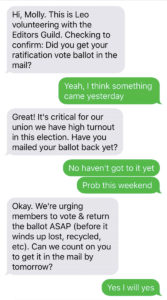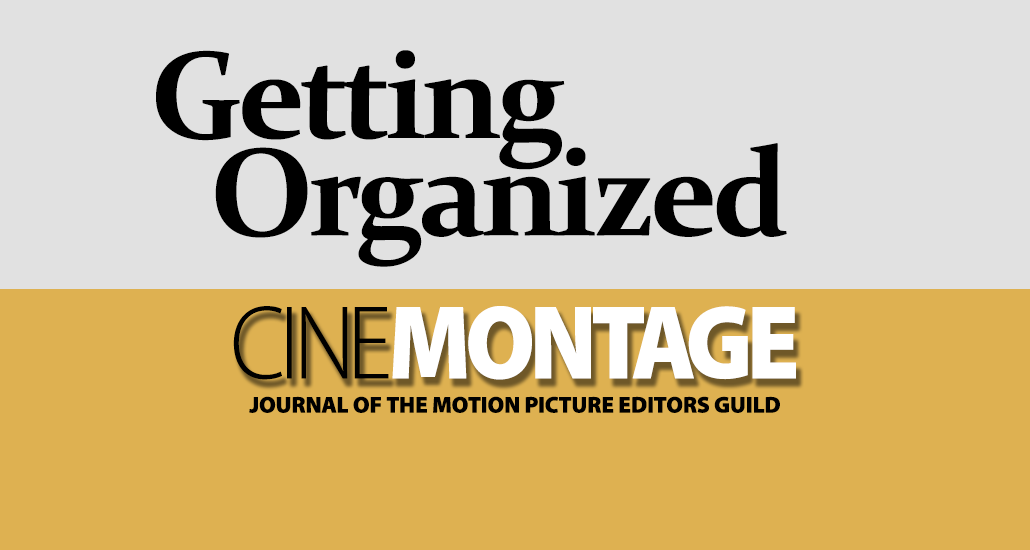by Rob Callahan
One of the social media companies competing for my ever-diminishing supply of attention sends me almost daily e-mails imploring me to log onto its site so that I can build an online simulacrum of my professional network. Those e-mails egg me on with a declarative catchphrase: “It’s not what you know, it’s who you know.”
In a short-lived career that ended so long ago it now seems almost to belong to a previous lifetime, I taught English for a stint. So, upon reading “It’s not what you know, it’s who you know,” I imagine myself wielding my red pen, changing the comma to a semicolon, replacing “who” with “whom” and scrawling “Trite!” in the margins.
But most clichés, however hackneyed, endure on account of their resonance with received wisdom. This stock phrase, too, contains some truth.
If you are a freelancer regularly hustling for gigs, you don’t need me to tell you this: Career success depends largely upon the strength of your network of colleagues and contacts. Talents, skills and abstract knowledge are all key, sure. But it takes a wide network of well-placed people well aware that you possess those keys in order to find open doors. Our members mostly get gigs through leads, not help-wanted ads, and those leads come down to who knows whom.
In this regard, what makes for the health of a union is not so very different from what makes for the health of a career. It’s less about information (what you know) than about relationships (whom you know).
The health of our union is, of course, my focus here. When the Guild’s elected leadership convenes its monthly meetings, a perennial topic of conversation is the need for greater membership engagement. Our want of such involvement manifests itself in a lot of different ways — disappointing attendance at union meetings, poor turnout in Guild elections, a reluctance to stand up on the job for oneself or one’s co-workers — but all are symptoms of members not feeling sufficient connection to, and not taking sufficient ownership of, the mission of our shared Guild.
Our Membership Outreach and Diversity Committees have done a lot of great work in recent years to promote members’ investment in the Guild. Initiatives such as the craft roundtables and the “I Am the Union” Facebook forum have helped strengthen the sense of community within our local. Thanks to these efforts, our union’s culture has been changing for the better. But we recognize a need to do more.
When it comes to member engagement, it’s easy to assume doing more is chiefly a matter of members knowing more. We might suppose members’ involvement in the union will improve if we simply improve the quality or quantity of the information they have — through the website, via e-mail updates, or in the pages of this magazine. Building a stronger union, in this view, is largely a matter of public relations: crafting a better message, getting that message before more eyeballs or otherwise burnishing the brand.
But a union’s real strength isn’t a function of its public relations so much as it is a function of its personal relationships. As with constructing a career, building a solid union is largely about cementing solid ties with colleagues. It’s a question not of knowledge but of connection. Only by fostering such connections can we build a union that’s not merely a brand but is instead a genuine community.

A campaign of member-to-member texting about last fall’s ratification vote helped to turn out more than three times the usual number of members voting in a Guild election.
The centrality of personal relationships to union strength is why most unions rely upon a system of shop stewards to keep members informed, to promote participation in union activities and to safeguard employees’ rights in the workplace. Shop stewards comprise an intermediate tier of grassroots leaders and trusted co-workers who bridge the gap between rank-and-file members and the organization’s central leadership. They ensure that the union isn’t merely an abstraction or some remote bureaucracy but an esteemed colleague.
When we witnessed the United Teachers of Los Angeles union turn out thousands earlier this year on picket lines and at rallies, it didn’t get its members in the streets just by holding press conferences or by sending out mass e-mails from union headquarters. The union had a disciplined network of school-based stewards — called “chapter chairs” — checking in directly and individually with co-workers at their school sites. UTLA’s mobilization of their members to action wasn’t so much about broadcasting facts or handing out fliers as it was about harnessing a network of respected, school-based leaders who had personal relationships reaching into every classroom.
Our Guild, too, has shop stewards in those facilities where members work consistent, long-term jobs. And the shop stewards we have do great work serving as the face of the union in their workplaces. But most of our members work as freelancers, without enduring connections to a specific workplace and a stable set of co-workers. A traditional steward system, therefore, can’t reach the bulk of our membership.
Here’s where technology — while never the panacea its boosters might claim it to be — can help.
During last fall’s ratification vote, we had a corps of activist members reaching out to their Guild colleagues via text message, engaging them in discussion of the issues at stake and urging them to return their ballots. Together, our volunteers directly contacted more than 7,000 Local 700 members by text, and 70 percent of those contacts developed into two-way conversations. Although we ran a large-scale operation to get out the vote, these were conversations, not mass e-mails, not announcements on the website, not posts on social media. It was an effort centered on interpersonal interaction — individual members talking to their colleagues.
And the effort yielded dramatic results. Ordinarily, fewer than 20 percent of Guild members participate in union elections; the overwhelming bulk of our membership usually remains effectively checked-out of our organization’s democratic process. But last fall, our texting volunteers helped achieve an astounding 71 percent of Local 700’s members to return their ballots.
Because this peer-to-peer texting proved such an effective way of engaging folks in discussion of the contract, as well as in the democratic process, we’ve decided to launch a new initiative that will make use of similar tools. However, instead of focusing just on a single mobilization — getting members to a meeting, or getting members to mail back their ballots — we want to establish more sustained channels for one-on-one communication about Guild matters. For those freelancers who don’t properly work in a shop and thus aren’t already connected to a shop steward, we’ll be building a network of “shopless” stewards. These are fellow members who are union activists and advocates, volunteering to connect their colleagues to the mission of the union, wherever those colleagues happen to be.
Unlike most unions’ traditional shop stewards, these advocates won’t be tasked with enforcing contracts — they’re not going to intervene with your supervisor when you’re pressured to work through a lunch break — but they will ensure that you get the access you need to union leadership and staff, including our field representatives who handle enforcement concerns. Most importantly, they’ll make sure your relationship to your union consists of more than just a weekly e-mail in your spam filter or a quarterly dues bill in your mailbox; they will provide a connection to a colleague who cares about all post-production professionals enjoying greater respect and greater clout on the job.
We’ll be rolling this initiative out over the course of the next several months, so don’t be surprised when your phone buzzes with a message from a colleague, introducing her- or himself as your union advocate. When that text comes, hopefully it will prove the beginning of a beautiful friendship.



